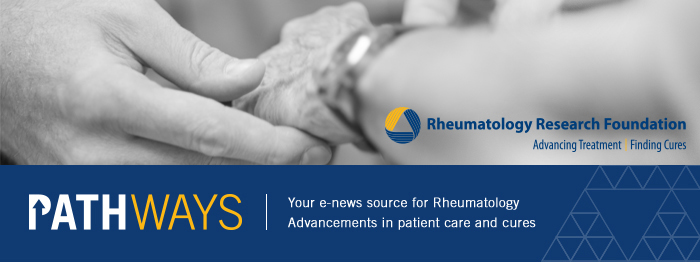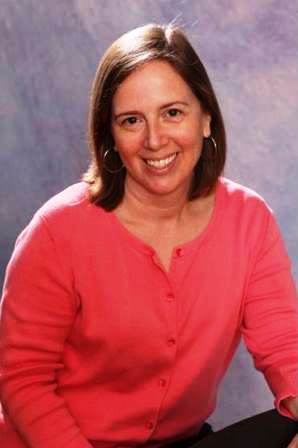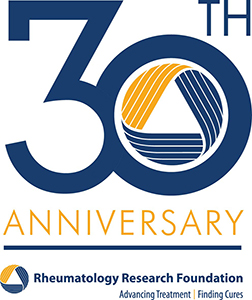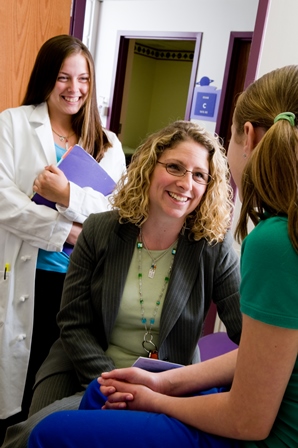Pathways

Volume 4 • Issue 9 • September 2015 • Rheumatology Research Foundation
Remembering a Legend
A practicing rheumatologist until his recent passing at 104 years old, Ephraim P. Engleman, MD, FACR, FACP, remains a giant in the field. Widely regarded as one of the founders of the modern practice of rheumatology, Dr. Engleman helped shape the future of the field through his dedication to research and his work with the Rheumatology Research Foundation.
Dr. Engleman’s commitment to research began early in his more than 60-year career. In 1975-76, he chaired the National Commission on Arthritis, a congressional task force charged with developing recommendations on how to address the lack of arthritis research and adequate patient care. The commission’s work resulted in the creation of what is now known as the National Institute of Arthritis and Musculoskeletal and Skin Diseases (NIAMS).
Dr. Engleman later started working with the Foundation to develop an award that would build more interest in rheumatology among residents by allowing them to get in-depth experience in the field. The partnership led to the Ephraim P. Engleman Endowed Resident Research Preceptorship, which funds a full-time research experience for a resident under the guidance of a mentor. In fiscal year 2006, the Foundation awarded the first ever Engleman preceptorship. To date, more than 10 residents have received the award and completed a research project with the help of their preceptors.
Dr. Engleman continued his focus on research, patients and helping the next generation of rheumatology professionals until the very end. Dr. Engleman passed away at his desk at University of California San Francisco (UCSF), where, according to his son, he was doing what he loved: “going up to UCSF – to the very end.” We remember Dr. Engleman with great pride and thank him for his remarkable contributions to rheumatology.
Patient Supports the Search for Solutions, Cure for RA

Melissa Young |
“My kids distract me while I do my injections. They’ll do a funny dance so I don’t have to focus too hard on the needle.” For Melissa Young, that one statement encompasses the biggest factors in her life: her 11-year-old twins and, after that, her rheumatoid arthritis (RA). Melissa has settled into the “new normal” of life with RA. However, her road to diagnosis and treatment has been long, and she’s preparing for the future rough patches that come with chronic pain. Melissa hopes support for the Rheumatology Research Foundation will provide her and others with rheumatic diseases better solutions to face future obstacles.
Melissa’s pain began more than a decade ago when she started having issues with her knee. Over the years, she went to an orthopedist for on-and-off pain and had multiple surgeries. Through the whole process, Melissa’s doctor tested her regularly for autoimmune diseases, but the results always came back negative. Eventually, the pain spread to her ankles. Once her wrists became so bad she could barely hold a dinner plate at times, she and her orthopedist agreed it was time for her to see a rheumatologist, who finally diagnosed her with RA. “I’d never once considered that anything like this would happen, where I was told I have a disease I’m going to have to manage for the rest of my life,’” she says. “It was really overwhelming, but at the same time, it was the first time in 10 years I felt like this is something that we can address.”
She says treatment has helped control her RA, but the disease still changes the way she lives her life. “I’m constantly aware of at least some part of my body that I used to just not have to worry about.” Melissa’s RA impacts the small decisions she has to make in everyday life, such as using a headset while on the phone because holding it gets too painful. “It’s a new normal, not just knowing your body and the comfort and discomfort, but also in how you plan your life,” Melissa explains. “It’s not just little decisions like not buying an 18 pound turkey because I have a hard time lifting it onto the table. It’s also big decisions about where I’m going to live and what job I’m going to do.” While house hunting and looking at two- and three-story homes, she realized her RA would eventually prevent her from being able to use all the stairs. As a result, she decided a split-level house with only a few stairs would be more practical while still fulfilling her wish list.
Melissa also made changes to the organizations she supports because of her RA. “I’m going to be on these medications for the rest of my life, and I don’t like that,” she says. “I need somebody who’s going to find a solution for my problems.”
Melissa used Charity Navigator, the nation’s largest evaluator of charities, to find organizations she was interested in supporting. With a four-star rating, the highest offered from Charity Navigator, she discovered the Rheumatology Research Foundation. The more research Melissa did into the Foundation, the more confident she became that this was the organization she wanted to support. “It’s tangible what the Foundation is doing. They’re actually showing strides in a direction toward finding better solutions.”
On the Foundation’s Giving Day in honor of its 30th anniversary, Melissa made her first donation. “To support the Foundation, which is trying to advance the field and find a better solution for us, just seems like a no-brainer.” She says her gift to the Foundation provides a chance to make a difference in the lives of people with rheumatic diseases. “I’m so happy the Foundation is supporting the work it is. I hope that there are breakthroughs in managing rheumatoid arthritis and, ultimately, a cure.”
 |
This year marks the 30th anniversary of the Rheumatology Research Foundation! To celebrate 30 years of advancing treatment of rheumatic diseases, the Foundation will profile 30 people who have made a significant impact in the world of rheumatology through their work with the Foundation. Please feel free to email us if you would like to contribute a story about how the work of the Foundation has directly impacted your life, or if you would love an opportunity to share your story or brag about your rheumatologist. We would love to hear from you!
30 Over 30: Mara L. Becker, MD, MSCE

Mara L. Becker, MD, MSCE |
Mara L. Becker, MD, MSCE, is dedicated to helping even the smallest patients find relief. Dr. Becker is the division director of pediatric rheumatology at Children's Mercy, Kansas City and an associate professor of pediatrics at the University of Missouri-Kansas City School of Medicine. She specializes in clinical pharmacology, juvenile localized scleroderma and juvenile idiopathic arthritis. She has received the Foundation's Investigator Award and Career Development Bridge Funding: R Bridge Award and shared her expertise with future doctors through the Foundation’s Pediatric Visiting Professorship. Now, she serves on the Foundation’s strategic planning task force.
According to the American Board of Pediatrics, there are fewer than 300 practicing pediatric rheumatologists in the United States, with entire states not having even one pediatric rheumatologist. Dr. Becker knows the demands of practicing in a rare subspecialty often mean focusing on patient care. However, thanks to the Foundation’s Investigator Award, which she received during her first job at Children’s Mercy Hospital in Kansas City, Dr. Becker has had the opportunity to explore a clinical question through research.
“The Foundation was instrumental in getting my research off the ground, keeping me funded and helping to propel my academic career,” says Dr. Becker. “When I received the grant it was validation that people within my own field found my ideas interesting and that was hugely important to me and my career. I’ve found I’ve been able to keep my academic interests alive in large part because of the Foundation’s support. We want to continue to investigate optimal treatments, as well as search for cures for our diseases, and the Foundation really keeps their eye on that and makes it a priority.”
In addition to research, as a pediatric rheumatologist, Dr. Becker sees the Foundation’s recruiting efforts as another of its greatest impacts. “The Foundation’s goal is to expand the workforce, which is exactly what we all need,” says Dr. Becker. “It knows the importance of attracting the brightest, most motivated residents. This will eventually move the field of rheumatology forward as a whole.”